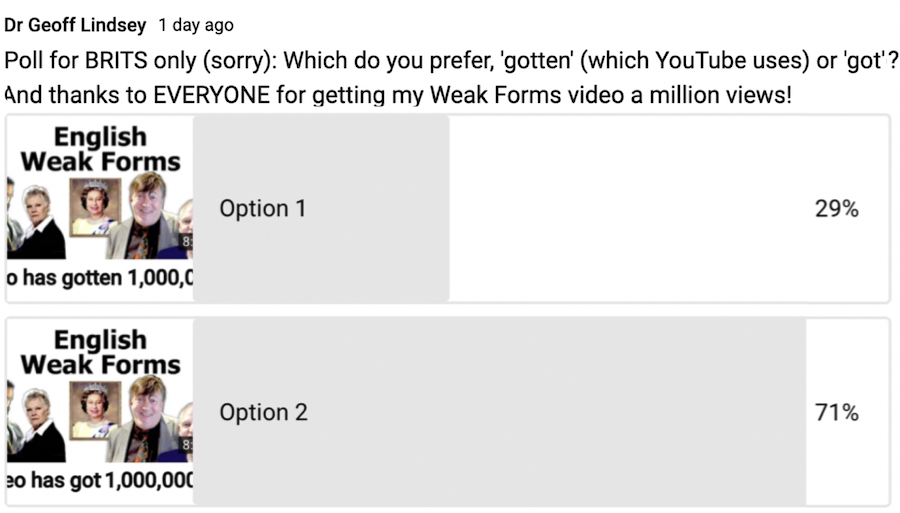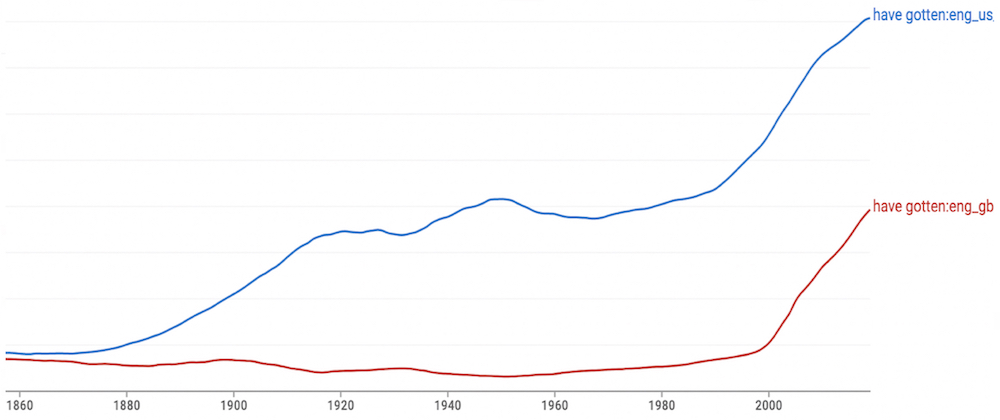Have you gotten gotten?
 I’m delighted that my video on Weak Forms recently passed one million views. As YouTube informed me: This video has gotten 1,000,000 views.
I’m delighted that my video on Weak Forms recently passed one million views. As YouTube informed me: This video has gotten 1,000,000 views.
Now that isn’t a sentence I myself would ever say or write, because my British dialect doesn’t use the word gotten. For me, the past participle of get is got, so I would have said This video has got one million views.
But in recent years the word gotten has been noted increasingly in the speech of Brits. I posted a poll in my channel’s community tab, asking my British viewers which of these two forms they prefer. By now the poll has got/gotten over two thousand votes: 71% prefer got, 29% gotten.

A number of commenters had objections to the poll. Several – chiefly Americans, I think – pointed out that has gotten and has got mean two different things:
Your video has gotten one million views = Your video has received one million views
Your video has got one million views = Your video has one million views
But the poll was aimed at Brits, many of whom, like me, haven’t got gotten at all. For people like me, has got is ambiguous, conveying both of those meanings. Incidentally, receive is more formal in tone than get, and in the relatively informal world of YouTube, I would have opted for the ambiguous got over the unambiguous received. On the other hand, for those who do use gotten, it can sound plain wrong to use got with the meaning ‘received’, e.g. I’ve just got this email from a friend.
We can certainly quibble about the poll’s methodology, but it confirmed what I expected, that the number of Brits who now happily use the word gotten is quite substantial.
It seems to be still a minority thing. Indeed, some Brits expressed bemusement at the poll, on the grounds that we simply don’t use the word here. But examples aren’t hard to find, from young and not so young speakers:
Many places have already gotten much warmer than that
She would henceforth need to learn to rein in a tendency that had clearly gotten out of hand
Online you’ll see quite a few documentaries who’ve gotten a tour round there
Over the years I have gotten pretty good I think at working from home
I know the US has gotten a lot of bad press recently
So why have humans gotten so much taller?
How many of you guys have ever gotten home from like a really stressful day?
I’ve never really gotten the whole art gallery thing
It’s gotten pretty bad these past few months
(I’ve) gotten a ton of really sweet letters
I’d gotten into a relationship with someone who had an addiction problem
He’d gotten more out of the FBI than they’d gotten out of him
Of course get is a fascinatingly (or infuriatingly) versatile verb. Any dictionary will list numerous meanings and usages, including a number of idiomatic ones. Just consider:
I like getting presents.
Please get my bag.
I’m getting tired.
I got promoted.
I got up, I got out, I got in.
I got round it.
I got it back.
I’ve got to go.
I didn’t get the joke.
The police got the thief.
I’m getting mad.
It’s getting me mad.
Could you get that call?
Let’s get moving.
I got to like him in the end.
I can’t get it to start.
Several British commenters on my poll suggested that they might use gotten for some of these meanings, but not for others. So a given speaker might say:
I’ve got ten messages this morning alone (‘received’)
BUT It’s just gotten warmer (‘become’)
But as we heard in the clips above, it’s possible to find Brits using gotten with a wide variety of meanings.
So where does this gotten come from? It certainly isn’t an American invention. It’s an old form used occasionally by Shakespeare:
You told not how Henry the Sixth hath lost
All that which Henry Fifth had gotten? (Henry VI, Part III)
And here it is in the 1700s:
The queen likewise ordered the thinnest silks that could be gotten (Swift, Gulliver’s Travels, 1726)
As soon as you have gotten an account of them exactly, you will be pleased to send it me (Richardson, Pamela, 1740)
Mrs Wilkins having therefore, by accident, gotten a true scent of the above story (Fielding, Tom Jones, 1749)
But then it seems to have fallen out of use, at least in standard English grammar. I checked the amazing Hyper-Concordance of the Victorian Literary Studies Archive and (unless I’m mistaken) gotten is entirely absent from these works:
Jane Austen: Emma; Pride and Prejudice; Sense and Sensibility
Charles Dickens: David Copperfield; Great Expectations; Oliver Twist
Thomas Hardy: Far from the Madding Crowd; The Mayor of Casterbridge; Tess of the d’Urbervilles
And gotten is similarly hard to find in American works of the 19th century. I couldn’t find it in any of:
Louisa May Alcott: Little Women
Nathaniel Hawthorne: The Scarlet Letter
Herman Melville: Moby-Dick
Mark Twain: The Adventures of Huckleberry Finn
Walt Whitman: Leaves of Grass
And I found it only once in the 261,864 words of Edgar Allan Poe’s short stories:
“That’s a lie!” said the metaphysician, for the wine had gotten a little into his head. (Bon-bon)
But if America didn’t invent gotten, perhaps we can say that America re-invented it. This Ngram shows it being used more and more in American publications from the late 19th century, while it remained dormant in British publications – until the internet age.

I feel sure that the internet has played a role in the recent rise of gotten among younger Brits. And I’m not just talking about the more or less conscious adoption of the linguistic behaviours of fashionable influencers, many of whom are of course American. Consider again the message from YouTube that I started this post with:![]() In various territories around the world, messages from the American internet giants like Amazon and Google are translated into Spanish, Japanese, etc. But in Britain they’re sometimes left in their original form.
In various territories around the world, messages from the American internet giants like Amazon and Google are translated into Spanish, Japanese, etc. But in Britain they’re sometimes left in their original form.
When this happens, crucially, there’s no overt marking of American-ness, as there is in American-accented speech. When Brits growing up in the internet age see a message like this one, there’s nothing to tell them that it’s from some other country: it’s just part of the fabric of life.

